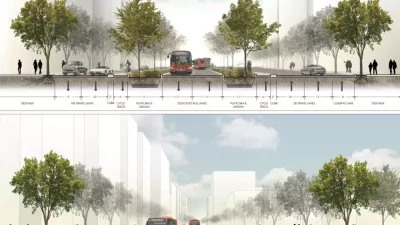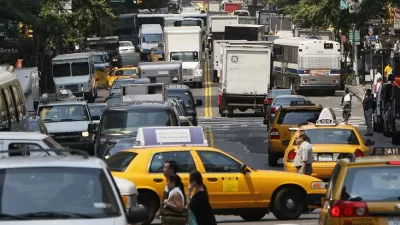Charles Komanoff, an economist, analyst and activist in New York, has created an elaborate spreadsheet looking at the cost of congestion to the city. His conclusion? Free transit and congestion pricing would relieve traffic.
Komanoff and writer Felix Salmon get particularly wonky with the stats in this article - transportation planners will find a lot to chew on.
"Medallion taxis do not pay the congestion charge, but there is a 33% taxi-fare surcharge. One tenth of that (around 3%) goes to the taxi drivers and owners; the rest (30%) goes to the MTA; the taxi surcharge alone raises enough money to make in-city commuter rail free.
Add it all up, and it's pretty much revenue-neutral, says Komanoff: the biggest line items are that you lose $1.46 billion in transit fares, while gaining $1.31 billion in congestion charges. But total time savings are the biggie: implement this plan and New Yorkers get over $2.5 billion of time back which would otherwise be spent wasted in traffic. Vehicle speeds in general rise about 20%, and as much as 25% between 9am and 10am."
FULL STORY: How driving a car into Manhattan costs $160

Maui's Vacation Rental Debate Turns Ugly
Verbal attacks, misinformation campaigns and fistfights plague a high-stakes debate to convert thousands of vacation rentals into long-term housing.

Planetizen Federal Action Tracker
A weekly monitor of how Trump’s orders and actions are impacting planners and planning in America.

In Urban Planning, AI Prompting Could be the New Design Thinking
Creativity has long been key to great urban design. What if we see AI as our new creative partner?

King County Supportive Housing Program Offers Hope for Unhoused Residents
The county is taking a ‘Housing First’ approach that prioritizes getting people into housing, then offering wraparound supportive services.

Researchers Use AI to Get Clearer Picture of US Housing
Analysts are using artificial intelligence to supercharge their research by allowing them to comb through data faster. Though these AI tools can be error prone, they save time and housing researchers are optimistic about the future.

Making Shared Micromobility More Inclusive
Cities and shared mobility system operators can do more to include people with disabilities in planning and operations, per a new report.
Urban Design for Planners 1: Software Tools
This six-course series explores essential urban design concepts using open source software and equips planners with the tools they need to participate fully in the urban design process.
Planning for Universal Design
Learn the tools for implementing Universal Design in planning regulations.
planning NEXT
Appalachian Highlands Housing Partners
Mpact (founded as Rail~Volution)
City of Camden Redevelopment Agency
City of Astoria
City of Portland
City of Laramie





























